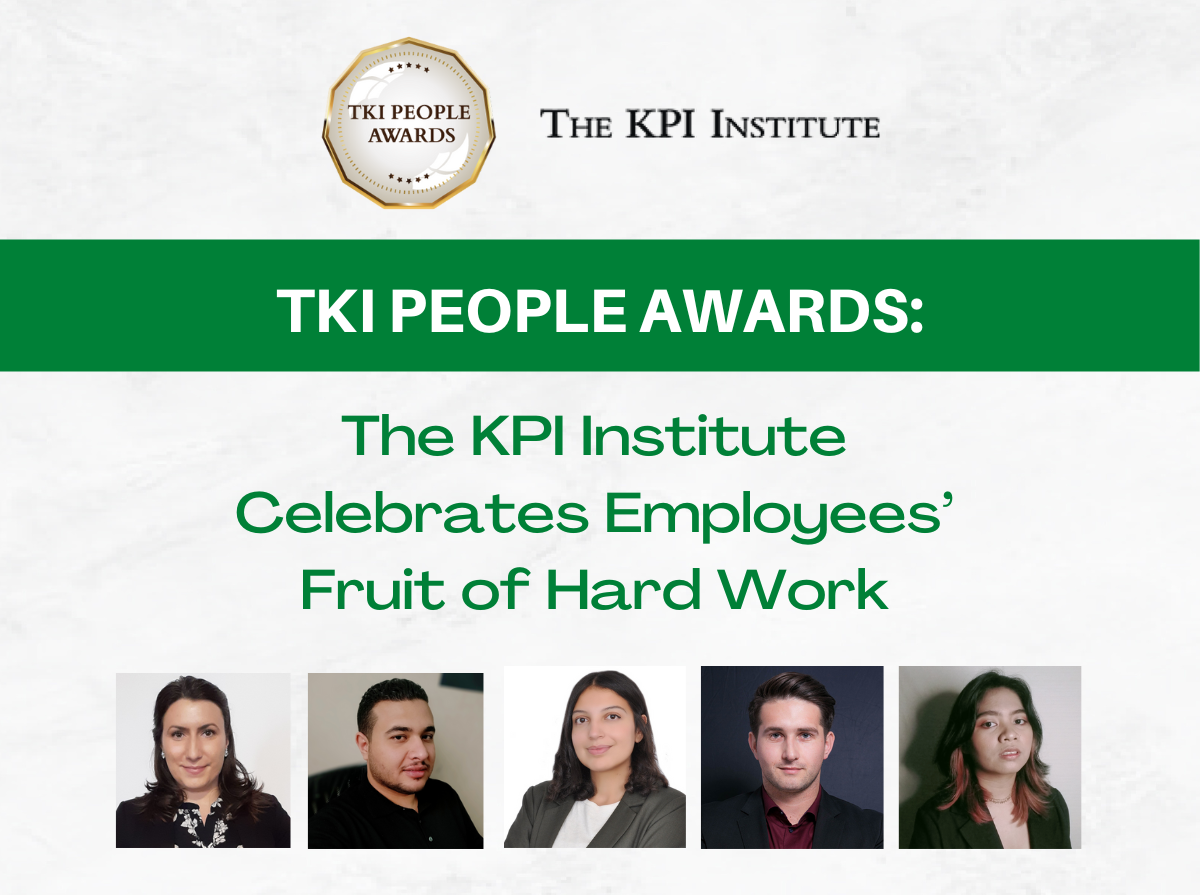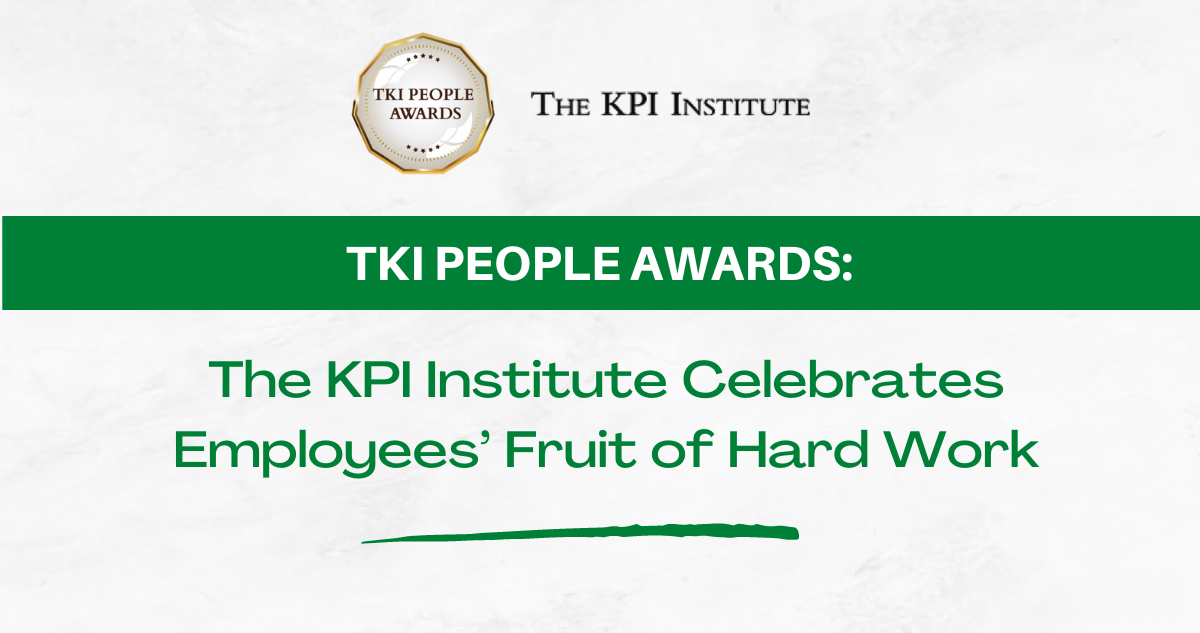
TKI PEOPLE AWARDS: The KPI Institute Celebrates Employees’ Fruit of Hard Work
September 21st, 2022 Posted by Kimberly Tilar Awards, Employees 0 thoughts on “TKI PEOPLE AWARDS: The KPI Institute Celebrates Employees’ Fruit of Hard Work”
The KPI Institute has announced the awardees of the Employee of the Month (EOM) for July 2022.
The TKI People Awards series features the employees and the teams recognized by The KPI Institute for going above and beyond expectations, excelling as team players, and creating a tremendous impact on the company.
The KPI Institute celebrates the success of five (5) employees at work. Learn more about the employees, who excel in the month of July through the interview below, where they share thoughts in receiving the recognition up to the career lessons they have learned as a professional that you may also practice in your working environment.

Raluca Vintila
Management Consultant
TKI Consulting
- What do you want to do when you are not working? What are your hobbies, passions, or involvement in your community?
Raluca: I love spending time outdoors as much as possible, especially traveling. In addition, gardening is one of the latest passions I discovered. I also love supporting local non-government organizations (NGOs) that look after environmental protection, forestation, and animal care.
2. What do you appreciate most about working at The KPI Institute?
Raluca: I appreciate the flexibility to match personal preferences and interests with TKI business needs. I think we have a super-open culture, where you have the freedom to contribute.
3. What are you looking forward to in terms of your new projects, collaborations, and role here at TKI?
Raluca: I think my current position is a good fit for me; exploring customer relationships and training delivery. I would love to continue in this endeavor. I already tried everything I wanted to try, like research and instructional design.

Mohamed Fouad
Art Director
Biodigy
- What does receiving the Employee of the Month award mean to you?
Mohamed: It means a lot to me— feeling appreciated by my superiors for my work and effort I exerted to every task, and the desire to achieve more achievements in the future.
2. What’s your favorite accomplishment so far at TKI?
Mohamed: My favorite accomplishment is when I worked on two branding projects. I am so honored to be part of creating the visual identities for ILMS & LMSL
3. When you’re faced with a challenge at work, how do you find a solution?
Mohamed: I search for the best solution, and ask my manager.
4. What would be the three main career lessons that you have learned thus far?
Mohamed: The three main career lessons I have learned so far are as follows:
- Trust the process as you will achieve what you dream about.
- Appreciate what you have.
- Always work on your skills on a daily basis.

Asmaa El Cadi
Marketing Manager
ILMS
- What does receiving the Employee of the Month award mean to you?
Asmaa: I was surprised when I first got to know about it [EOM award]. I am glad that my work did not get unnoticed, and I am very grateful to work with such a highly skilled team of very kind people.
2. What’s your favorite accomplishment so far at TKI?
Asmaa: This award itself is a great accomplishment to me, plus the fact that my team and I are currently managing our work pretty well. We got to understand each other’s way of working and strengths, and I can say— now, we harmoniously complement each other.
3. When you’re faced with a challenge at work, how do you find a solution?
Asmaa: I admit, I was usually the type of person who would try hard to find a solution by myself whenever I am facing any challenges. With my current team, I learned to seek help and advice from my colleagues. I have the chance to work with experienced people from different backgrounds, so there is always someone who has my back.
4. What would be the three main career lessons that you have learned thus far?
Asmaa: The first career lesson I have learned is getting to know your team members and developing good relationships based on respect and appreciation. The second thing is being result-oriented and trying to have the same vision as your team to accomplish any project. Lastly, maintaining a good work-life balance: staying healthy and getting the time to do the things you love will positively impact your productivity at work.

Tudor Modruz
Senior Business Development
MENA
- What does receiving the Employee of the Month award mean to you?
Tudor: Receiving the EOM award is an acknowledgement of hard work and dedication. This award also provides another incentive to continue the development path. This award would certainly not have been possible without the help of my colleagues, who I would like to thank on this occasion.
2. What’s your favorite accomplishment so far at TKI?
Tudor: My favorite accomplishment is seeing the developed ideas proved useful and added value to the related activities.
3. When you’re faced with a challenge at work, how do you find a solution?
Tudor: Challenges are sometimes the big learning opportunities in everyone’s career. In my case, changing views and balancing the impact of any decision make the best solution that is easier to reach.
4. What would be the three main career lessons that you have learned thus far?
Tudor: The following are the three main lessons I learned so far as a professional:
- Recognize and appreciate the success of others.
- Teamwork is a key aspect.
- Keep learning every day.

Kimberly Tilar
Publisher and Editor Specialist
TKI Research
- What does receiving the Employee of the Month award mean to you?
Kimberly: Receiving the EOM award means a lot to me. It serves as a reminder to become more competent, and consistent in giving my best in every project or task that I do. This award also shows that my work values and performance are appreciated by my colleagues.
Thus, I would like to thank these people: Len Cristobal, Daniela Vuta, Cristina Mihailoaie, Dragos Anton, Andrei Costea, and Alexandru Seliscan, for guiding me to become the best version of myself since day one.
2. What’s your favorite accomplishment so far at TKI?
Kimberly: Growing professionally and personally with my colleagues here in TKI is something I can consider my favorite accomplishment. So, aside from my participation in the production of the Performance Magazine, one of my favorite accomplishments is receiving the final versions of the articles written by our researchers and contributors. That means, at some point in the writing process, I have been helpful to my colleagues in improving their pieces and encouraging them to express and share their knowledge in the best form it possibly can be.
3. When you’re faced with a challenge at work, how do you find a solution?
Kimberly: I admit that I am the type of person who likes to figure things out on my own as I do not want to cause any inconveniences to others. But I have been able to change this attitude. Whenever I face a challenge at work now, I search for the possible solution first on my own. Then, I consult with my superiors and workmates for their suggestions or feedback. I narrow down all the options, ideas, and advice I receive to come up with the best solution.
However, it is important to take a breath when things are becoming overwhelming before making a decision. So, allowing myself to pause and have a peaceful mind is what I actually do first when facing a challenge. After that, when I know that I am in the right place and mind, I conquer everything.
4. What would be the three main career lessons that you have learned thus far?
Kimberly: The three main career lessons that I have learned so far as a young professional, especially in the TKI are:
- Communication is the key to everything: Conflicts can be avoided when good communication is being practiced, especially in the work from home setup with a community of diverse culture.
- Good skills are a must but having empathy skills will lead you to other greater things: In an article from Harvard Business Review, it has been mentioned that “empathic workplaces tend to enjoy stronger collaboration, less stress, and greater morale, and their employees bounce back more quickly from difficult moments such as layoffs.”
- Everyday is a new opportunity to grow: In TKI, I am able to handle different tasks and projects, and collaborate with my colleagues from different departments. So, in every situation, I always make sure that I have takeaways, something I have learned and would like to keep to improve. Moreover, do not be afraid to ask questions. You will learn a lot by asking questions.
The KPI Institute is a globally recognized organization that focuses on business performance. It offers research projects in 12 practice areas, including strategy, KPIs, employee performance, and customer service as well as innovation performance.
The KPI Institute uses a variety of publications, subscription services, and a knowledge platform in disseminating insights, that is available to registered members. Training and consultation services are also provided worldwide to assist in putting these insights into reality.




